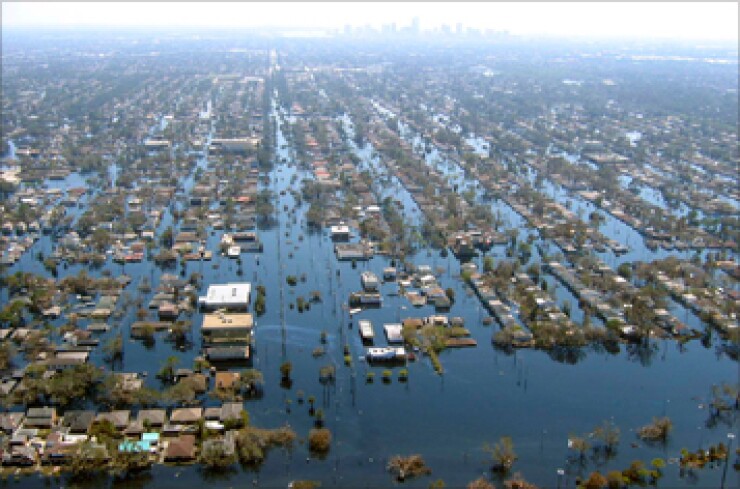Home insurance premiums are soaring and homebuying demand is waning because of the National Flood Insurance Program's overhaul, stakeholders claim in a new federal lawsuit.
Dozens of local and state governments are seeking to halt, and learn more about, Risk Rating 2.0, the Federal Emergency Management Agency's
"Risk Rating 2.0 has created a growing sense of uncertainty in the minds of the home buying public," wrote Dan Mills, CEO of the Home Builders Association of Greater New Orleans [HBAGNO], in a declaration filed last week. "Uncertainty in the marketplace has caused reluctance to invest either in improvements to existing homes, or to purchase new homes."
The suit was filed by Louisiana Attorney General Jeff Landry last week in the U.S. District Court for the Eastern District of Louisiana, and names FEMA and the Department of Homeland Security as defendants. FEMA declined to comment, while the DHS didn't respond to a request for comment.

The HBAGNO and Louisiana-based Miller Home Mortgage, in declarations filed alongside the suit, cite examples of premiums that have skyrocketed under the new methodology. Some communities in the St. Charles Parish outside of New Orleans will see premiums on average rise 752%, increasing anywhere from $784 to $6,677.
"This is going to devastate home ownership," said Tony Turner, senior vice president of New Orleans-based Gulf Coast Bank and Trust. "People who are currently in their homes will no longer be able to afford those homes simply because of the flood coverage."
Gulf Coast Bank and Trust isn't a plaintiff in the complaint, but Turner echoed its sentiments. Louisiana,
"Whenever you add these premiums to people's escrow accounts, it's huge because the servicers of these loans are going to put those borrowers in a negative escrow position," Turner said. "They're going to require that borrower to now increase their monthly escrows going forward, and they're not going to be able to afford these monthly payments that come along with their (principal & interest) payment."
The CEO of Miller Home Mortgage said his firm has already seen mortgage origination activity in SHFAs decline because of the premium hike, and 75% of his company's revenue comes from home loans in those areas.
Lawmakers in March filed a bill to deliver relief to homeowners affected by the new risk rating, which FEMA introduced to the 55-year-old NFIP in 2021. In 2020, the NFIP issued more than 5 million policies accounting for over $1.3 trillion in coverage; it lost 300,000 policyholders since Risk Rating 2.0 was introduced, according to the lawsuit.
Plaintiffs say FEMA hasn't disclosed details around its risk modeling, which accounts for hypothetical future events rather than the legacy system looking at historical events. Rising premiums are capped at 18% annual hikes, while new homebuyers can't claim the grandfathered rates of current homeowners selling their properties.
FEMA also no longer offers rate discounts to buyers of elevated properties, harming developers and homeowners who may now sell homes at a loss, according to the lawsuit. Current policyholders won't know their new annual rate until they receive their renewal notice, and won't know their premium increase until they receive their Declaration Page, after they renewed their policy.
"Its reliance on such undisclosed, hypothetical, and abstract possibilities results in widely divergent risk assessments as compared to other modeling systems," the lawsuit said of Risk Rating 2.0.
Plaintiffs are seeking a preliminary and permanent injunction against FEMA from using Risk Rating 2.0 and force the agency to fully disclose its methodology.
The agencies have not yet to respond to the lawsuit in federal court.




